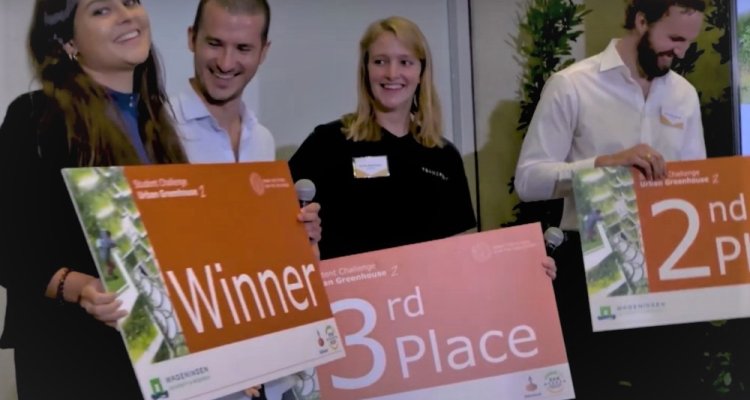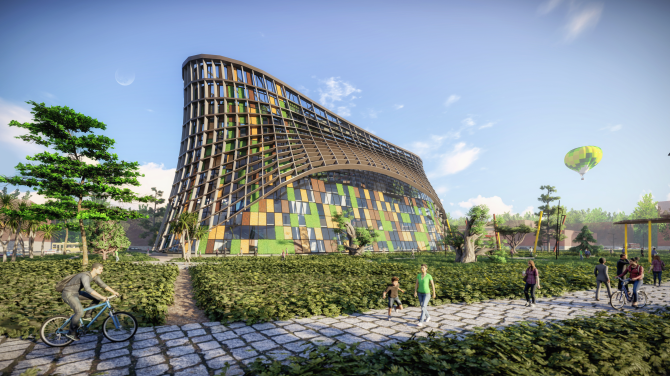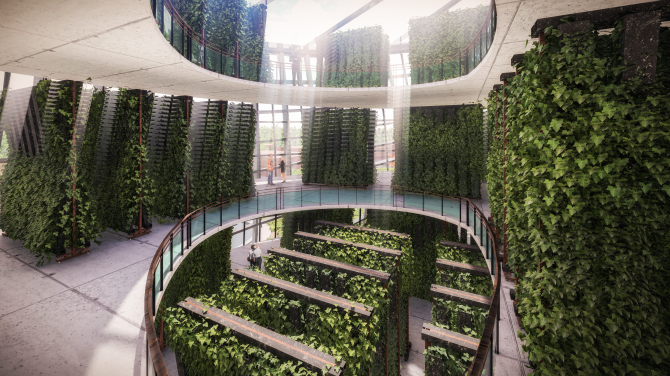
News
Team Bagua wins Urban Greenhouse Challenge ‘2
The students of Team Bagua may call themselves winners of the second edition of the Urban Greenhouse Challenge. Their design of an urban greenhouse not only provides crops, but also serves as an education centre.
During the second edition of the Urban Greenhouse Challenge, 53 teams around the world joined the race to bring urban farming to the next level. They designed a greenhouse for the Chinese city Dongguan. After nine months of hard work, ten teams entered the finale last month: Teams USP, Northwest A&F University Team, Team KAS, TeAMSpirit, Argos, CoExist, Team Bagua, AIGreen, Green Rhapsody, and InnerCity.
Ten minute pitch
On 27 August, in front of a small live audience at Wageningen Univeristy & Research and many digital viewers, jury member Tiffany Tsui announced Team Bagua as the winner of the challenge. The team received a prize of 10 thousand euro. Team KAS was awarded second, and TeAMSpirit third place.
In the morning, all teams had the opportunity to convince the jury of their idea one last time in a short, ten minute pitch. It also allowed jury members to ask questions that were not yet answered in the pitch or the report. ‘On top of that, seeing some of the students live for the first time was very valuable’, says Chair of jury Tiffany Tsui. In this edition during the COVID-19 pandemic, the student teams and jury members only communicated online so far. ‘It was nice to put faces to the proposals’.
Food and education
The winning narrow, colorful greenhouse of team Bagua has food production areas, a restaurant and markets. Given the dense population in Dongguan, one of the goals of team Bagua was to grow large quantities of crops in their greenhouse. ‘We wanted to have a large yield on a small surface’, says Alejandro Rueda Gómez of team Bagua. And they succeeded. Using vertical farming, the greenhouse provides vegetables for over 18 thousand people a day.

The team also considered circularity and made good use of the local climate. As Dongguan is a tropical city, there is plenty of sunlight and rain water. The students used as much of those natural resources as possible and regulated the amount of natural light each food production area receives, since not all crops need the same amount of light.
Besides crop production, the students also made their urban greenhouse a hub for education. They envision it as a centre which will educate farmers and school children. ‘In our urban greenhouse we want to train the next generation farmers and teach them how to produce food in the coming decades’, says Rueda Gómez.

Partner prize
Besides first, second and third prize, one team received the partner prize. During the ten month competition, the student teams collaborated with partners, such as Rabobank and Codema. All thirty partners voted for their favorite team. Team CoExist received the most votes and took home the partner prize. The team was honored to receive the partner prize. ‘The partners helped us a lot with how to implement the technologies and our knowledge in the real world’, says team member Nikolaos Alfieris.
Students have an open mindset: they think without boundaries. We, the partners, learned from that.
Next edition
The Urban Greenhouse Challenge takes place every other year. Every edition is based on a location in a different part of the world: Amsterdam in the first edition and Dongguan in the second. The third edition will start in October 2022 and the Challenge organisers are currently looking for a suitable location that offers rich context and possibilities for realisation. Companies and organisations interested in partnering up with Wageningen University & Research in this project can contact Rio Pals at rio.pals@wur.nl.